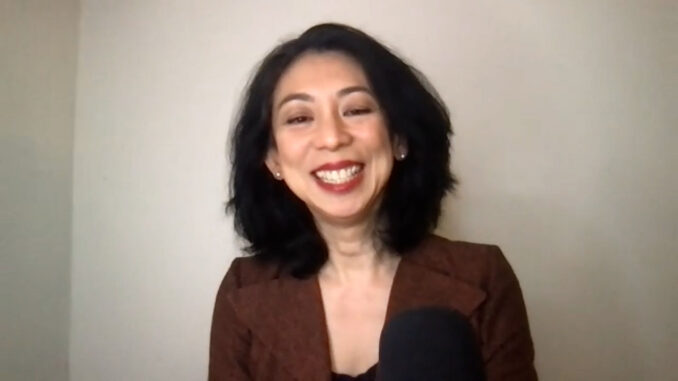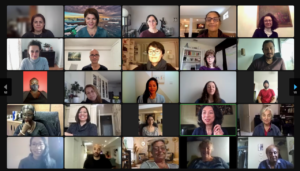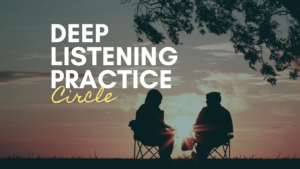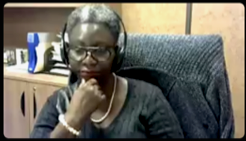
Toronto, ON– Since she started hosting a digital space to help people better connect emotionally late last year, Christine Samuel hit a record high in attendance this February.
“There are over 140 people RSVP’d for tomorrow’s session,” says Samuel. “The highest record I’ve ever had in a single event. My Zoom account only can accommodate 100 people max.”
Self-proclaimed as an Inner Work Coach, Samuel shares relationship-building tools monthly with people across North America in a free group called, “Deep Listening Practice Circle,” on meet-up.com.
The idea for the public event came to her in the thick of the Covid-19 pandemic. At the time, Samuel was working as an IBM User Experience Designer, where she spent the last 20 years in front of a computer screen. This, along with mental health concerns, prompted her to aim to make a difference by co-leading weekly mindfulness sessions at the office.
“I really see, especially with Covid, what matters to me and what really matters to the world,” says Samuel.
She says that regardless, the rigour of “keeping up appearances” and scaling the “corporate ladder” at her job lost its appeal and she eventually quit.
“I have chosen a more joyful, sustainable, and generative way of being, working, and contributing to the world,” says Samuel.

Samuel says “Now mindfulness has become very familiar, like very common.” Still, Samuel’s group stands apart because of its core practice: deep listening.
What does it mean to listen?
The International Reading Association (IRA) says that listening is the act of understanding spoken language.
In a survey by Accenture, 96 percent of respondents say that on average, they would consider themselves to be good listeners. But data from a study called “The Plateau Effect” from Carnegie Mellon University suggests that people grossly overestimate their comprehension and that the older we get, the more distracted we are in our daily lives and the worse we become at listening. It also mentions that people generally use their listening time when speaking to others, to think of a response or to drift into other thoughts.
Listening and Wellbeing
According to Lumen Learning, communication encompasses both receiving and relaying messages. Better Help says erosion of this process can result in the inability to develop or maintain relationships. Research shows lack of human connection can be more harmful to health than smoking and obesity. The coronavirus pandemic has also added further barriers to connection. In a recent Statistics Canada survey, more than one in ten Canadians, ages 15 and older, say they often feel lonely due to a lack of meaningful bonds. A study from Government Medical College in India says loneliness can lead to various psychiatric disorders like depression, alcohol abuse, child abuse, sleep problems, personality disorders, and Alzheimer’s disease.
Why Focus on Deep Listening?

Samuel says deep listening requires the hearer to commit to understanding the speaker’s perspective without judgement.
“In deep listening, what I like people to do or to invite is, to really listen from their heart,” says Samuel. “I want people to experience how is it like to be truly seen, how is it like to be truly listened to by another human being because just that simple intention, simple gesture, simple way of being with someone is life-changing.”
She says in order to do this, the listener should give their full attention to both verbal and nonverbal cues, such as the words being used, the speaker’s body language, and their tone. She also asserts that deep listening is an opportunity to sense and feel as it allows participants to engage without expectations, show their authentic selves, and engage genuinely with each other, all while leaving room for nuance.
“We don’t really use it much, we only use thinking and the analytical,” says Samuel.
According to the University of Waterloo, This heavy thinking and analytical style of listening that is most used is called critical listening. It happens when the focus is on understanding what is said then evaluating, judging, and forming an opinion.

Esther Fala, a Guelph resident and credit manager at Hammond Manufacturing was an early member of Samuel’s deep listening circle. She believes the rewards of what she learned there will come with continual practice.
“I do believe I can definitely benefit from this if I continue with it,” says Fala. “I believe that everyone could use more listening skills, given all the noises around our world today.”
When asked if she plans to ever place the growing group behind a paywall to make a profit, Samuel says no for now.
“This is too beautiful, too powerful to keep it small and to keep it for myself. It’s more about being human and I want people to feel it first.”

Be the first to comment